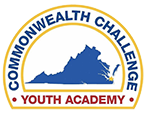Career and Post-Residential Advisors
Tanya Pamplin
Career and Post-Res Advisor
tpamplin@vachallenge.org
757-491-5932 Ext. 241
Deborah Thomas, BSW, MBA
Career and Post-Res Advisor
dthomas@vachallenge.org
757-491-5932 Ext. 249
Goal Setting
During the residential phase, Career Counselors assist Cadets in developing short term, intermediate, and long-term goals using the Post Residential Action Plan (PRAP). Each Cadet meets with his/her Career Counselor individually to set goals, secure placement, and resolve any obstacles that may hinder their overall success.
Matched Goals
The goals are matched to the academy’s eight core components that cadets seek to master while at Camp Pendleton. These components help position cadets to succeed once they graduate from the program.
Career Interest and Assessment Tests
To assist cadets in identifying their goals and career interests, career counselors work with them by administering a few different career assessments and inventories.
The ASVAB
One, the Armed Services Vocational Aptitude Battery (ASVAB), is a test used by the military to measure what cadets have learned so far, and helps them to see how well they might do in military service, if they decide they are interested in serving.
The Virginia Wizard
Another tool that career counselors use with cadets is the Virginia Wizard. This online tool helps the counselor guide the cadet through several different assessments that are designed to assess various skills, see which career groups match these skills, find out what general interests are and how they relate to career categories, and to search real career opportunities that line up with each cadet’s profile.
It also helps with interviewing techniques, and provides information about available internships and apprenticeships.
Job / Career Training & Education
Setting these goals helps cadets to begin to discover the specific types of job training and education each one will need to become successful in his or her chosen profession.
Vocational education opportunities in the residential phase include trades training in areas such as welding, automotive, nursing, and Information Technology.
Job fairs are scheduled for area colleges, schools, and prospective employers to come to Camp Pendleton to speak with interested cadets. At the job fair, cadets may sometimes also interview, in addition to learning more about their particular fields of interest.
Job Skills Training
While at ChalleNGe, cadets are career prepared by attending skills classes taught by Career Counselors. Topics Covered Include:
- Career Assessment- Cadets will use trait-based online assessments using psychometrics to reliably measure correlations between personality traits and other characteristic attitudes-to discover which careers may be a best “fit” for them
- Identify Career Clusters and Careers and Employability Trends
- Explore knowledge and skills required to pursue future educational opportunities
- Explore college admittance, offerings, and payment options. Cadets also explore technicial trades, and apprenticeship opportunties
- Understanding work ethics
- Filling out applications
- Skills in Resume and Cover Letter Writing
- Practice and Participate in Mock Interview-Cadets practice answering interview questions. Using STAR method. The STAR Interview Method is proven way to answer behavioral interview questions.
- Dressing for Success-presenting yourself for an interview.
Additional Training in Life Skills
Along with the skills needed to find, get and keep a good job, cadets also receive class instruction in other areas that are vital to accomplishing their goals. Examples include classes in personal finance, and applying for college financial aid. These can help to strengthen the cadet’s overall life skills.
Partner Organizations
Commonwealth ChalleNGe Youth Academy has partnered with several local businesses, organizations and educational institutions to ensure that cadets have access, both to job training opportunities, and to job and educational placements. Our current partners, among others, include:
• Job Corps, a free education and training program that helps young people learn a career, earn a high school diploma or GED, and find and keep a good job
• Tidewater Community College, one of the 23 community colleges in the Virginia Community College System (VCCS)
• Everest College, where cadets can access vocational training
• Tidewater Tech, where cadets can take courses in automotive repair, building and maintenance repair, HVAC or welding.
